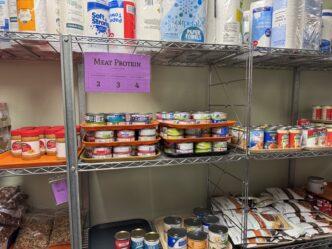CLEMSON, S.C. — Clemson University has appointed M. Soledad Peresin as director of the Wood Utilization + Design Institute (WU+D), a center of excellence dedicated to advancing sustainable wood-based innovations through research, education and industry collaboration.
A globally recognized leader in renewable biomaterials and sustainable design, Peresin brings to Clemson more than 20 years of academic and industry experience focused on transforming lignocellulosic biomass into high-value, real-world solutions. She most recently served as a professor in the College of Forestry, Wildlife and Environment at Auburn University.
“Soledad’s expertise in nanocellulose, forest bioproducts, and circular bioeconomy strategies positions her as a transformative leader for the Institute,” said Matthew Holt, dean of the College of Agriculture, Forestry and Life Sciences. “Her strategic vision and global network will enhance Clemson’s ability to drive innovation in wood utilization and catalyze economic development throughout the region.”
Peresin earned her Ph.D. in Forest Biomaterials from North Carolina State University and Licenciate degree in Analytical Chemistry with a focus on Pulp and Paper Engineering from Universidad Nacional del Litoral in Argentina. Following her doctoral studies, she worked for six years as a Senior Scientist at VTT, the Technical Research Centre of Finland, where she contributed to the development of high-performance fiber-based products and advanced the surface chemistry of lignocellulosic substrates in close collaboration with industry. She has authored more than 85 peer-reviewed publications, six book chapters, co-edited a book and holds one patent. She has delivered over 100 presentations at national and international conferences and secured more than $11 million in competitive external funding from the National Science Foundation (NSF), U.S. Department of Agriculture (USDA), and Department of Energy (DOE), among others.
As WU+D director, Peresin will maintain complementary academic homes in Clemson’s Department of Forestry and Environmental Conservation and Department of Materials Science and Engineering.
A Vision for Growth and Innovation
Peresin said she is “very excited” to lead WU+D, calling the position a convergence of her passions for sustainable innovation, interdisciplinary collaboration and industry engagement.
“WU+D is uniquely positioned at the intersection of research, material design and real-world application, an ecosystem I have thrived in throughout my career,” said Peresin. “With Clemson’s tremendous breadth of expertise, WU+D can build functional, market-ready solutions while cultivating the next generation of scientists and engineers.”
Peresin praised the legacy of Layton, whose leadership was honored with the establishment of the Patricia “Pat” Layton Endowed Directorship in 2022 through a $2 million gift by Mickey and Amy Scott.
Layton will remain with the Institute as Strategic Advisor, where she will leverage her experience in both industry and academics to help broaden WU+D’s impact.
“Working with Pat during this transition will be invaluable,” Peresin said. “Her deep institutional knowledge, cultivated partnerships, and unwavering commitment to advancing sustainable wood utilization provide both inspiration and continuity.”
Strategic Priorities for WU+D
As director, Peresin will pursue five core priorities to elevate the Institute’s national and global impact:
- Driving research and innovation in wood-based materials, including high-performance polymers, hybrid composites, coatings, and adhesives.
- Building strategic partnerships across academia, government, and industry to accelerate innovation and commercialization.
- Expanding stakeholder engagement and growing the endowment to support research, infrastructure, and outreach.
- Investing in workforce development and experiential learning, including hands-on student training and interdisciplinary collaboration.
- Promoting a sustainable and inclusive bioeconomy by integrating life-cycle thinking and equity into every facet of the Institute’s work.
Positioning WU+D to Address Regional and National Needs
Peresin envisions WU+D as a strategic platform aligned with regional and national priorities related to sustainable development, forest sector revitalization, and advanced manufacturing. As a former leader in the NSF-funded BRIDGES Engine initiative, she sees an opportunity for the Institute to anchor South Carolina’s role in the emerging circular bioeconomy.
“The Institute is ideally positioned to support regional efforts, such as repurposing surplus timber, restoring local processing capacity, and supporting forest landowners, and national programs like the Federal Buy Clean initiative and carbon-smart forestry strategies,” she said.
In response to the recent wave of mill closures in South Carolina, which has created an estimated surplus of 8.2 million tons of wood fiber and an 85% decline in forestry-related GDP, Peresin sees WU+D playing a catalytic role. Key initiatives will include:
- Developing value-added markets for timber, such as mass timber, CLT panels, and nanocellulose-based materials.
- Supporting the re-establishment of local processing infrastructure in partnership with state and federal agencies.
- Leading demonstration projects that promote the adoption of engineered wood systems in public buildings.
- Assisting the SC Forest Recovery Task Force with market analysis, innovation forums, and pilot programs.
- Expanding education and technical training programs to develop a skilled workforce for emerging wood product industries.
“By marrying materials innovation, supply-chain development and education, WU+D can reconnect South Carolina’s forests to a thriving market, revitalizing rural economies, landowner returns, and the state’s broader forestry sector,” Peresin said.
About the Wood Utilization + Design Institute
The Wood Utilization + Design Institute at Clemson University serves as a collaborative hub for research, teaching and engagement across the entire wood value chain. Through partnerships with industry, government, and academia, WU+D supports applied research in engineered wood systems, bio-based composites, and sustainable design while advancing workforce development and economic growth in the forest products sector.
To learn more, visit clemson.edu/wud.







